Tajikistan Strives to Use Water Resources Efficiently for the Benefit of All Central Asian Countries
Read also
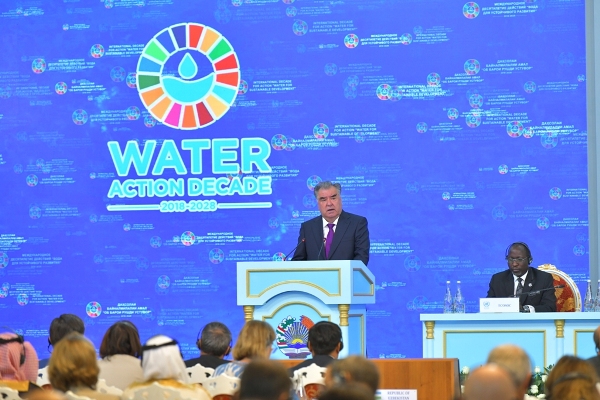
DUSHANBE, 07.06.2022 (NIAT Khovar) – “Integrated water resources management, including the integration of water with energy, food security and environmental issues, is one of the key tools for addressing existing problems,” noted President Emomali Rahmon in his speech at the Second Dushanbe Water Conference.
According to him, this issue is also very important for Tajikistan, where more than 98% of electricity is generated by hydroelectric power plants. About 80% of agricultural production is provided by irrigated lands.
“There are a lot of discussions around this issue today. Last year’s report of the World Hydropower Association confirmed that strengthening the sector can play a key role in ensuring economic growth, as well as in adapting to the effects of climate change,” he added.
Tajikistan, which has rich hydropower resources, can make a significant contribution in this direction. The total hydropower capacity of the country is 527 billion kilowatt-hours (kWh) per year, of which Tajikistan is utilizing only 3-4%.
“Today we continue the construction of the Rogun hydroelectric power plant with a total capacity of 17 billion kilowatt-hours (kW). The construction of this facility is an outstanding example of our effort in this direction. Hydroelectric power, along with the production of clean and affordable energy, will also make a significant contribution to the sustainable management of water resources, reducing the risk of floods and droughts, and reducing greenhouse gas emissions into the atmosphere. It should be noted that most of the electricity from the Rogun HPP will be exported to countries in the region that need energy, which is expected to contribute to the economic and social development of these countries as well. Also, the Rogun HPP will make a significant contribution to strengthening cross-border cooperation, which is one of the most important global issues,” President Emomali Rahmon added.
“We pay close attention to this issue, since cross-border cooperation, especially in the Central South Asian region in the water and energy sector, plays a key role in resolving many issues. Tajikistan contains 60% of the water resources of Central Asia, and always strives to use them effectively for the benefit of all countries in the region. That is why we prioritize the development of cross-border cooperation within the framework of our chairmanship in the International Fund for Saving the Aral Sea. Just a few days ago, together with our close neighbor the Republic of Uzbekistan, we launched a joint project to build two hydroelectric power plants in Tajikistan with a total capacity of 320 megawatts (MW), which is a good example of the above,” said he.











 Lonely Planet Includes Tajikistan among the World’s Best Travel Experiences
Lonely Planet Includes Tajikistan among the World’s Best Travel Experiences Emomali Rahmon and Xi Jinping Highlight Significance of Launching Direct Passenger Flights between Dushanbe and Beijing
Emomali Rahmon and Xi Jinping Highlight Significance of Launching Direct Passenger Flights between Dushanbe and Beijing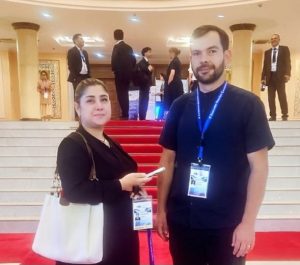 Tajikistan Provides Key Platform for Science–Policy Dialogue on Glacier Preservation, Says UCA Researcher
Tajikistan Provides Key Platform for Science–Policy Dialogue on Glacier Preservation, Says UCA Researcher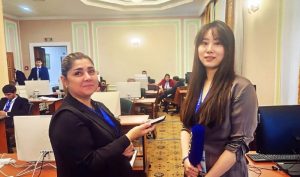 CGTN Journalist Praises Tajikistan’s Leadership on Glaciers’ Issues and Highlights China-Tajikistan Cooperation
CGTN Journalist Praises Tajikistan’s Leadership on Glaciers’ Issues and Highlights China-Tajikistan Cooperation UN Women Official Stresses the Role of Women in Climate Action at Glaciers’ Conference in Dushanbe
UN Women Official Stresses the Role of Women in Climate Action at Glaciers’ Conference in Dushanbe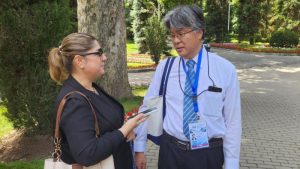 Japanese Researcher Highlights Tajikistan’s Role in Regional Water Security at High-Level Glaciers’ Conference
Japanese Researcher Highlights Tajikistan’s Role in Regional Water Security at High-Level Glaciers’ Conference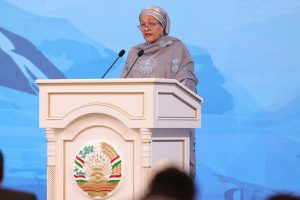 “This is Not Just Ice – This is Life”: UN Deputy Chief Calls for Urgent Action at Glaciers Conference in Dushanbe
“This is Not Just Ice – This is Life”: UN Deputy Chief Calls for Urgent Action at Glaciers Conference in Dushanbe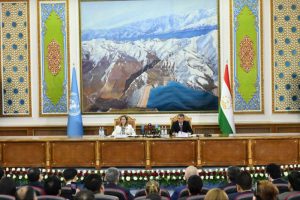 Dushanbe Hosts Landmark International High-Level Conference on Glaciers’ Preservation
Dushanbe Hosts Landmark International High-Level Conference on Glaciers’ Preservation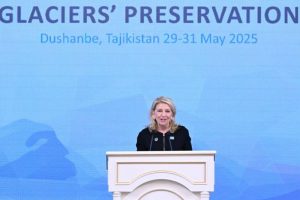 The Climate Crisis Is Primarily a Crisis of Children’s Rights
The Climate Crisis Is Primarily a Crisis of Children’s Rights Chinese Scientist Highlights Glacier Retreat as a Tangible Reality for Tajikistan, the Region, and the World
Chinese Scientist Highlights Glacier Retreat as a Tangible Reality for Tajikistan, the Region, and the World Dushanbe Conference Launches New Era in Global Glacier Diplomacy
Dushanbe Conference Launches New Era in Global Glacier Diplomacy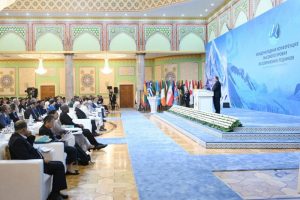 Global Leaders Urged to Fund UN Trust for Glacier Preservation
Global Leaders Urged to Fund UN Trust for Glacier Preservation














